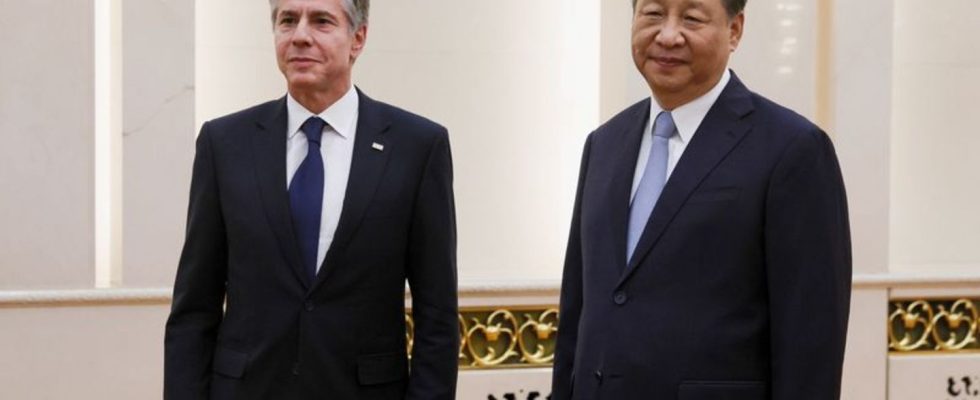diplomacy
Xi Jinping sees “progress” in relation to the US
US Secretary of State Antony Blinken meets President of China Xi Jinping at the Great Hall of the People. photo
© Leah Millis/Pool REUTERS/AP/dpa
For the first time, the US and China are talking directly to each other again. Foreign Minister Blinken has to listen to a lot of criticism in Beijing. Surprisingly, there is also a meeting with head of state and party leader Xi Jinping.
China’s head of state and party leader Xi Jinping sees “progress” in relations with the United States as a result of the talks with US Secretary of State Antony Blinken. Both sides had “reached agreement on certain issues,” Xi Jinping said at a surprise meeting with Blinken in Beijing on Monday. “That’s very good.” Chinese state television showed pictures of the meeting. The relationship between the two great powers has been very tense for a long time due to a number of points of contention.
Blinken have had long, frank and in-depth talks with top foreign policy chief Wang Yi and foreign minister Qin Gang, the president noted. Both sides have made their positions clear and agreed to implement agreements he reached at a meeting with US President Joe Biden on the Indonesian island of Bali in November. The summit of the G20 states of major industrial and emerging powers took place there at the time.
Interactions between states should always be based on mutual respect and sincerity, Xi Jinping said. “I hope that through his visit, Secretary of State Blinken can make a positive contribution to stabilizing relations between China and the United States.” Blinken’s visit marks the first visit to China by a US Secretary of State since 2018.
Long conversations with foreign politician Wang Yi
Blinken had previously held extensive talks with China’s top foreign policy leader, Wang Yi. In the hierarchy of power, he is above Secretary of State Qin Gang, with whom the US Secretary of State held a seven-and-a-half-hour conference on Sunday. After a long radio silence, both sides resumed direct high-level dialogue with the meetings. Official statements from both sides largely unanimously described the talks as frank, deep and constructive.
Blinken is the highest-ranking visitor from the US since US President Joe Biden took office in January 2021. Both sides are at odds over trade issues, Chinese backing for Russia’s war of aggression in Ukraine, China’s territorial claims in the South China Sea and its threats to the democratic island republic of Taiwan.
Also meetings in Berlin
While the USA and China are again talking directly to each other, the exchange between Beijing and Berlin is gaining momentum again: the new Chinese Prime Minister Li Qiang began a visit to Germany in Berlin with a meeting with Federal President Frank-Walter Steinmeier. Government consultations with Chancellor Olaf Scholz (SPD) and ministers from both sides will follow on Tuesday.
During his meeting with the US Secretary of State, Chinese leader Wang Yi did not mince his words. He accused the US of having a “misperception” of his country, which in turn leads to “wrong policies” towards the People’s Republic. Blinken’s visit comes at a critical time: “It is necessary to choose between dialogue or confrontation, cooperation or conflict.” The US Secretary of State had already wanted to come in February. He canceled at short notice because of a suspected Chinese spy balloon over the United States.
Wang Yi urged the US to stop promoting the “Chinese threat theory.” They must also lift “illegal unilateral sanctions” and end his country’s “suppression of technological development.” Furthermore, the US should no longer be allowed to interfere in China’s internal affairs.
Disagreement on Taiwan issue remains
The former foreign minister emphasized that there was “no room for compromises” for China, particularly on the Taiwan question. The US would have to remain faithful to the one China principle, honor its commitments to Beijing, respect China’s sovereignty and territorial integrity, and firmly oppose Taiwan independence. He is referring to US support for the island. As early as 1979, the USA committed itself to Taiwan’s ability to defend itself, which up until now has mostly meant arms deliveries.
However, China regards the democratic island republic as part of the People’s Republic and is threatening to conquer it. One China policy is commonly understood to mean that Beijing is recognized as the only legitimate government. Taiwan, on the other hand, has had an independent government for more than seven decades and has long since given up the claim of wanting to represent all of China. For its part, Beijing is trying to isolate Taiwan internationally with the one-China principle.

